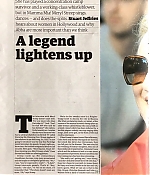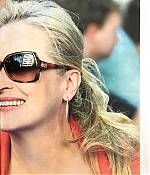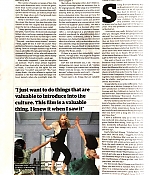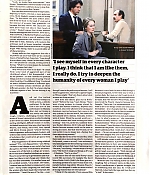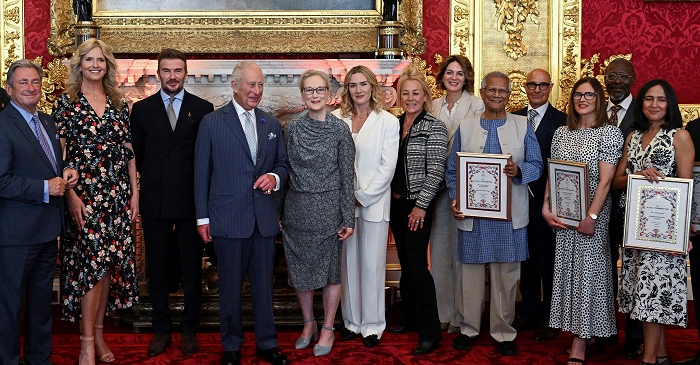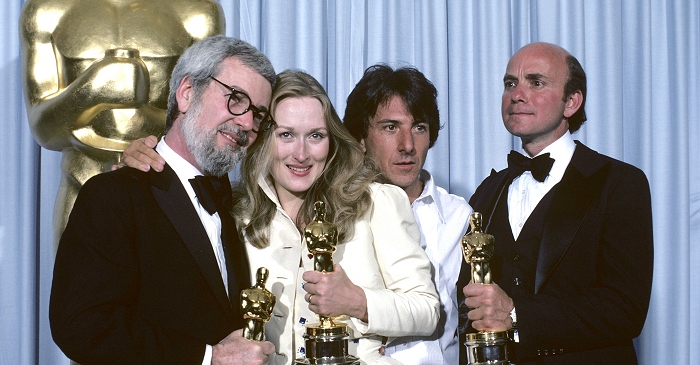|
Simply Streep is your premiere online resource on Meryl Streep's work on film, television and in the theatre - a career that has won her acclaim to be one of the world's greatest living actresses, winning three Academy Awards for "Kramer vs. Kramer", "Sophie's Choice" and "The Iron Lady". Created in 1999, Simply Streep has built an extensive collection over the past 25 years to discover Miss Streep's body of work through thousands of photographs, articles and video clips. Enjoy your stay and check back soon.
|
|
A legend lightens up
The Guardian ·
July 02, 2008
· Written by Stuart Jeffries
|
The interview with Meryl Streep doesn’t start well. “Do you know who Alan Partridge is?” I ask. “Isn’t he that MP who said he has bulimia?” she replies. Unfortunately not. I explain that he was a character who had a satirical chatshow on British TV called Knowing Me, Knowing You. Streep giggles at the reference to an Abba song. So, I say, I’m just going to introduce you the way that Partridge would introduce his guests. Streep’s right eyebrow rises. She’s either intrigued or about to call security. Here goes. “Knowing me, Stuart Jeffries; knowing you, Meryl Streep, a-hah!” I lean forward and make an ushering gesture. Streep cracks up. Her extraordinary cheekbones become even more accentuated and she laughs in a delightful girlish way. “No,” I say, “you’re supposed to reply” – “A-hah!” Streep interrupts gamely. That’s it! “Hey, thanks,” she says, “if I’m on his show, I’ll remember that.” The show doesn’t exist any more. “Oh,” says Streep. We’re in this swanky suite in a Knightsbridge hotel to discuss her role in Mamma Mia! (their exclamation mark, not mine), a film version of the musical in which Streep plays an older woman called Donna who runs a B&B on a Greek island which has been infected by a terrible plague: nobody can stop singing Abba songs, until some god, in the form of the end credits, intervenes. When Donna’s former lovers (Pierce Brosnan, Colin Firth and Stellan Skarsgard) are lured to the island like latter-day Odysseuses, they too fall prey to the disease. The men stay for the wedding of Donna’s daughter, who one of them fathered 20 years before. Donna isn’t sure which and the audience’s task is to care about this question of paternity. Donna’s sex life in the intervening years has been less interesting.
“She really isn’t getting any,” says Streep, “and she’s deluded herself she’s OK with that.” Does her character succumb to James Bond, Mr Darcy or a horny Swede in the last reel? Oh, have a guess. What we can say is that in the film, Streep, Christine Baranski and Julie Walters form a kind of Golden Girls trio (Streep is Bea Arthur to Walters’ randy Rue McLanahan), each seeking to get their mojo back. The number of people not aware of how this story ends diminishes daily: across the globe, more than 17,000 people see the show each night. Before Phyllida Lloyd directed this swift, spirited movie version, 30 million people had seen the stage show and it had grossed more than $2bn at the box office. Streep is the film’s heart, and its revelation. She sings! She dances! She does the splits! She confers on her role a dignity that miraculously stops the movie collapsing into mere camp! “I keep getting asked about the scene with the splits,” says Streep. She does look amazingly limber when, mid-song, wearing dungarees, she jumps on a bed and flicks out her legs to meet her outstretched hands like a teenage cossack. “They ask – was there a body double?” she says. “Yeah, right! Or was it CGI? Of course! They grafted my face on to Olga Korbut’s body.” She’s joking. Note to younger readers: Olga Korbut was an adorable, Olympic gold-winning Soviet gymnast of the early 1970s, who will always be remembered in her teenage state; Meryl Streep is an actor who turned 59 barely a week ago.
What really happened? “I just did the splits on instinct. That’s what always happens with my acting. As an actor, you’re not allowed to think. I couldn’t do the splits for you right now.” Couldn’t you just try? “No,” says Streep firmly. She also refuses to reprise that moment in the film that made me laugh out loud, namely when she poutingly sings the first lines of Super Trouper (“I was so sick and tired of everything/When I called you last night from Glasgow.”) Marvellous. But some critics don’t think so. In press screenings there are murmurs that to be singing karaoke Abba songs in a relentlessly cheerful Hollywood musical is a terrible career misstep. After all, Streep is renowned for much more substantial roles. She won an Oscar for her performance in the heart-rending divorce drama Kramer Vs Kramer (1979) and another for her performance as a concentration camp survivor in Sophie’s Choice (1982). She was a melancholy outcast in a doomed affair with Jeremy Irons (The French Lieutenant’s Woman, 1981); a metallurgist at a plutonium plant possibly murdered for whistleblowing about worker safety (Silkwood, 1983); a Danish baroness-cum-farmer having another doomed affair (Out of Africa, 1985); an Australian mother who claimed a dingo took her baby (A Cry in the Dark, 1988); a Virginia Woolf-loving publisher nicknamed Mrs Dalloway whose friend is dying of Aids (The Hours, 2002). If there is a gap in her remarkably varied oeuvre, it’s high jinks. You might be forgiven for thinking that Meryl Streep doesn’t do jaunty. Until now. Isn’t this role beneath you, I ask. “I’m not strategising my career moves at all,” replies Streep. “I haven’t got a career that I’m building. When I swim my 55 laps, I try to remember the movies I’ve been in order, and I can’t … the past is just a miasma. There’s no career path.
“I just want to do things that are valuable to introduce into the culture,” she continues. “This film [Mamma Mia!] is a valuable thing. I knew it when I saw it.” Streep first saw Mamma Mia! on Broadway seven years ago. She was in a bit of a pickle. She had to dream up an excursion for some friends of Louisa, the youngest of her four children by husband Don Gummer, the sculptor to whom she has been married for the past 30 years. Only one problem: it was October 2001 in Manhattan. “Everybody was really dimmed spiritually after 9/11. I thought, ‘What am I going to do with the kids?’ So I took all these 10-year-olds to see a matinee of Mamma Mia!. They walked in and they sat there with their heads in their hands. Dimmed is the word – they were sad all the time, you know? The first part was really wordy, and then Dancing Queen started up. And for the rest of the show they were dancing on their chairs and they were so, so happy. We all went out of the theatre floating on the air. I thought, ‘What a gift to New York right now’.” She sent a thank-you letter to the cast. Producer Judy Cramer and director Phyllida Lloyd saw it, and mentally filed it away. They knew that Mamma Mia! would one day be a film. They also knew that Streep had sung with great charm in both Postcards from the Edge and A Prairie Home Companion. Putting two and two together, they realised that Streep would some day be a bella – and perhaps even a prima – Donna. And so she is.
Streep tells the story rather differently. “Judy had seen me as Mother Courage in Tony Kushner’s production [of Bertolt Brecht’s Mother Courage and Her Children] in Central Park the year before last. That’s what made her know I was destined to be Donna.” How weird – from Brecht to Benny Andersson and Björn Ulvaeus . But why did she accept the role? “It’s a requirement of popular culture that you strike an ironic distance. This doesn’t. It’s a film about women and their whole experiences being hopeful and youthful and older and suffering the regrets that you have over a long life. It’s visceral and I love that.” I have a different idea as to why Streep was seduced into playing Donna. It was to prove Pauline Kael wrong. Years ago Kael, the late, massively influential New Yorker film critic, wrote that Streep only acted “from the neck up”. Kael’s bile hurt Streep. “It killed me,” she once said. But at least, I suggest, by taking this role in Mamma Mia! you are, in a very literal, high-kicking way, proving Kael wrong. Few 59-year-old screen actors seem as lively from the neck down as she does as Donna. “I’m incapable of not thinking about what Pauline wrote,” Streep replies seriously. “And you know what I think? That Pauline was a poor Jewish girl who was at Berkeley with all these rich Pasadena Wasps with long blonde hair, and the heartlessness of them got her. And then, years later, she sees me.”
For the record, Meryl Streep is no Pasadena Wasp: she was born in Summit, New Jersey in 1949, to a commercial artist called Mary and pharmaceutical executive called Harry. Her ancestry is a mixture of English, Swiss, Irish and Dutch. On her father’s side she can trace distant Sephardic Jewish ancestors from Spain. But she still has long blonde hair. “Look, we make these associations,” says Streep. “Pauline had a visceral dislike of me and there’s no movie I could have done to stop that. She made up a person that I’m not.” But Kael also underestimated Streep’s talent. Replying to Kael’s criticism, a more generous critic, Molly Haskell, recently wrote of Streep that: “To the extent she does deflect attention from the body to the head, it’s not just in the interest of accents, hair, gimmicks: it’s because the lady thinks. Her characters can have more than one idea in their heads at a time.” Haskell argues that Streep remains singular among great film actresses. Bette Davis, Joan Crawford, or Katharine Hepburn each had a recognisable voice, a way of reading a line, certain expressions that remained constant from film to film. Similarly, with modern film actresses such as Susan Sarandon, Julianne Moore or Glenn Close we know what we’re going to get. With Streep, there is no predictable set of characteristics. Streep balks at this suggestion that she is so protean an actor that there are no constant traces of herself in her characters. “I see myself in everybody I play. I think I’m like them, I really do.” She pauses for a second, looking down at her lap. “What I try to do is deepen the humanity of each woman that I play.”
Why would you want to do that? “It comes from some kind of aggrieved part of my childhood where I felt disregarded – not by my parents – so that I needed to question things and show a woman who is saying: ‘I’m not what I look like. I’m a different thing.’ I’ve played so many different women of different ages, and everybody always mentions all those different accents I do, but I’m always playing different aspects of me. I’m not looking it up in a book.” And yet the notion persists that Streep is a chilly actress, a robotic performer. To be sure, that’s not true of her performance in Mamma Mia!. And yet Donna is also hardly the kind of tough, complex, challenging woman whom actors of Streep’s generation revelled in playing in the 1970s and 1980s. Hollywood has stopped putting intelligent, difficult women on screen. As Haskell points out, time was when Sigourney Weaver, Jane Fonda, Sally Field, Sissy Spacek and Meryl Streep played “whistle-blowers, union organisers, anthropologists, hookers, and writers with raised consciousnesses, in movies of substance that would never get past a story conference today”. What happened to all those strong celluloid women? “It’s a very big question,” says Streep. “Women’s real change in our society has been disruptive, but feels evolutionarily necessary. So now 60% of the kids in college are women. More than 50% of medical students are women. They’re not at the top in government and business, but there is real change and I think that has terrified everybody. It’s terrified men and it’s terrified women.” As a result, she thinks, “women have performed a compensatory step back”. Streep starts imagining out loud what the women who have made that step back tell themselves. “‘I won’t be sexy if I’m this – even though I want to be paid an equal amount, I still want to appear sexy, I still want to appear fragile, so I’ll lose weight.’ That’s my theory about what women are doing anyway.” How does this theory play out in Hollywood? “Before the war,” says Streep, “there were strong women in cinema played by women like Barbara Stanwyck, Hepburn and Crawford, who were allowed to be strong and dominate movies because they were in no way a threat. In the real world, the characters they played were a fantasy. Basically, women were at home. When the second world war – in which women had been working and liked working – was over, in the 50s, suddenly there was Marilyn Monroe, Jill St John and Brigitte Bardot because women could not be seen as strong any more. And that was because, in the real world, it was no longer just a fantasy that there were strong women.”
But why did the era of the 70s and 80s, when there were once more strong roles for women in Hollywood, come to an end? I can understand why men might be terrified of strong women, but why would women find them frightening too? “Because,” says Streep, “women want to be with men.” She starts to laugh and shrugs as if to say – it happens. “You’re so slow!” But where does all this leave Streep’s most recent film successes, for example The Devil Wears Prada (2006). Didn’t she there give us a disturbing portrait of a cruel woman from hell, namely fashion mag editor Miranda Priestly? Wasn’t she designed to make us more terrified of strong women than we were already? “I think it’s the opposite. It’s an unusual film because it’s very hard for men to feel through a female protagonist, to feel their way to what a woman feels. But men just don’t want to do it. Who knows why? Maybe it’s just uncomfortable for them. But with The Devil Wears Prada, many men loved the Priestly character because they thought: ‘That’s me. I’m misunderstood. All I want to do is run things cleanly and clear away the bullshit. ‘ A lot of people feel that – underappreciated in the job they do. But it’s so rare for men to empathise with a woman’s plight.” “The relationship between men and women is key to what’s going on,” she continues.
“I think it’s really behind a lot of what we call fundamentalism.” What sort of fundamentalism do you mean? “I was thinking of the Pope saying women can’t be priests. That’s fundamentalism. I don’t understand that. I really don’t. I don’t feel lesser … I’m very strong and capable and smart, and I can’t imagine why you’ve got to be led to heaven by your husband. I just don’t get it.” A PR minder comes in and says there’s time for one more question. It proves to be the worst of the interview. Is there any reason to hope that our evolution will be more comfortable gender-wise than it has been hitherto? That girlish laugh sounds again. “Well, we can all stay friends and have sex, it seems to me.” Let’s hope. Indeed, that does seem to be the moral of Mamma Mia!, if you care to seek a moral at all. Minutes later I’m walking down the street laughing. Not at Streep’s views on the evolutionary ramifications of gender struggle, but at something else she said. As I walk past Harrods, I play back the tape and hear her say “a-hah!” It slays me.


